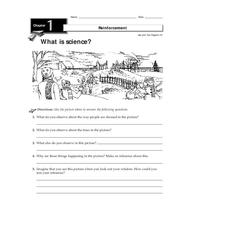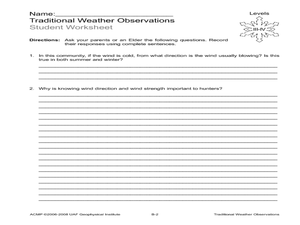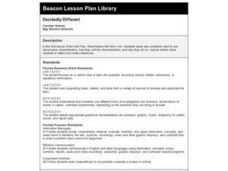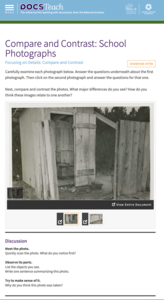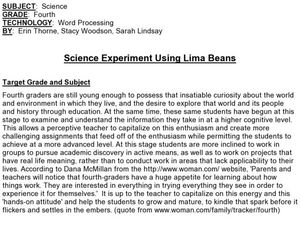Curated OER
Testing Foods
Students perform an experiment using brown paper bags to determine which foods have oil in them. This task assesses student's abilities to make simple observations and inferences from them.
Curated OER
Colors, Characters, & Clues
Students investigate inferences. They define inference, view a Powerpoint presentation, answer questions about a picture book, and identify clues throughout the story as examples of inferences.
Curated OER
Colors, Characters, & Clues: White Socks
Students examine the process of making inferences. They define inference, view a Powerpoint presentation, and as a whole group locate clues in the pictures of a short story, locating written clues to reinforce their conclusions.
Curated OER
Colored Drops
Students examine the properties of a liquid that contains water and food coloring and a liquid that contains water, food coloring and a liquid detergent. They interpret their data, describe properties, and make reasonable explanations...
Curated OER
What is Science?
In this scientific observations activity, students study an illustration and then complete 5 short answer questions about what they observe happening in the picture.
Curated OER
Crickets Guided Discovery
Sixth graders investigate insect anatomy by analyzing a live cricket. For this insect science lesson, 6th graders discuss their knowledge of insects and describe their characteristics from memory. Students observe live crickets in...
Curated OER
Clouds and the Weather
Fourth graders analyze the relationship of clouds and local weather. Students also observe and record cloud data and weather conditions daily as they research different cloud types. The data is analyzed looking for trends in daily...
Curated OER
The Amazing Apple
Students analyze an apple. In this lesson about developing inquiry skills, students do an experiment with an apple. Students make several observations about the apple. Students answer questions to help them improve and practice their...
Curated OER
The Milk Bottle Quiz
In this scientific statements worksheet, students identify statements as an observation, inference, question, prediction, or factual. This worksheet has 7 matching questions.
Curated OER
Red, Green, and Blue Mystery Liquids! Hypothesis or Inference?
Eighth graders are actively involved in the scientific method and inquiry as they form quick hypotheses based upon a teacher set of mystery liquids. They determine the need to make additional observations of the liquids.
Curated OER
Weather Observation Journal
Young scholars research weather patterns. In this weather lesson, students read Chester Noongwook's Rules of Weather Observation and keep a weather journal for one month. Young scholars observe the weather patterns throughout the month.
Curated OER
Traditional Weather Observations
Learners explore traditional methods of weather observation. In this weather instructional activity, students interview grown-ups regarding wind. Learners learn how winds can help forecast weather.
Columbus City Schools
Sedimentary Rocks
Turn your class discussion of rock formation from ho-hum to holy hornfels! Junior geologists gain experience in identifying rock types and rock origins, with an emphasis in hypothesizing the environment needed to form certain rocks. The...
Curated OER
Decidedly Different
Fifth graders inquire as to why scientists use observable characteristics, how they sort the characteristics, and why they do so. They write journal entries to be used throughout this unit.
Curated OER
QuickPlan: Mystery Boxes
Primaries explore the concepts of observation and inference. Given a set of six sealed boxes, children lift, tip, or gently shake in order to make observations about what is inside. The lesson plan gives preparation instructions in...
Curated OER
Veggie Chop and Data Analysis
First graders chop vegetables into fractions. In this fractions lesson, 1st graders cut vegetables, collect data about favorite vegetables and create a bar graph using the information. Students make inferences about the data and record...
California Academy of Science
Human Evolution
As the great and hilarious Tim Minchin once said, "Science is simply the word we use to describe a method of organizing our curiosity." Science is more than just a guess; it is based on questions, observations, and evidence. High...
Curated OER
The Water Cycle
Fifth graders explore the major components of the water cycle. They pay close attention to evaporation, condensation, and precipitation. A water cycle kit is set up in the classroom, which learners observe for a couple of days before the...
Curated OER
What are Igneous Rocks and How are They Formed?
Crystals form before your very eyes! What sixth grader wouldn't enjoy this lesson plan on igneous rock formation? Using hot Salol, junior geologists observe the crystal formation process as the material cools. This comprehensive lesson...
DocsTeach
Compare and Contrast: School Photographs
Separate and very unequal! An interactive presents learners with two images: a photograph of a boys' bathroom at a school in Gloucester County, Virginia, and a second of a girls' bathroom at a different school in the same county. The...
Curated OER
Sunrise/Sunset
Third graders discovver what causes the dramatic colors of a sunset by seeing the changing color of light as it passes through a clear container of water to which milk is gradually added. They measure the liquids and observe what happens...
Curated OER
Science Experiment Using Lima Beans
Fourth graders tie together elements about the world and their environment. Students incorporate styles of higher order thinking skills. Students measure skills of observations, conclusions, inferences and predictions.
NASA
The Big Climate Change Experiment Lesson 3: Climate Change Lines of Evidence
Consider the preponderance of evidence when making a verdict. The third of five lessons in Unit 1: The Big Climate Change Experiment focuses on the evidence for climate change. Learners study graphs, diagrams, and pictures regarding...
Have Fun Teaching
Growing Seeds (9)
A seed, water, and sunlight. A seed, water, but no sunlight. A seed, sunlight, but no water. Young biologists are ask to infer what will happen to seeds given five different growing conditions.






